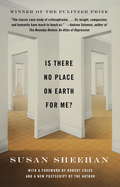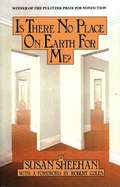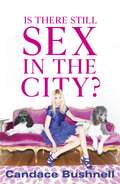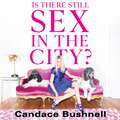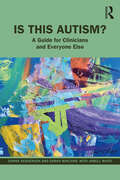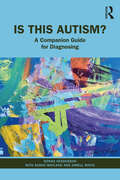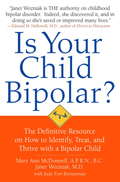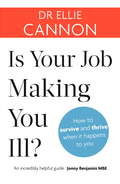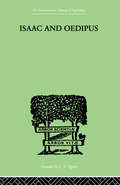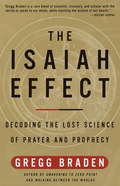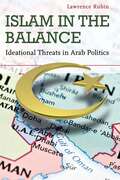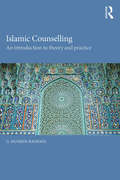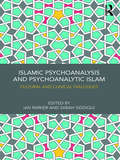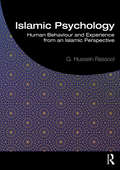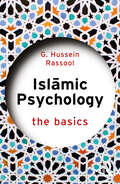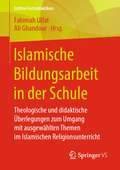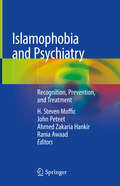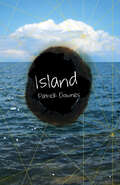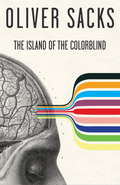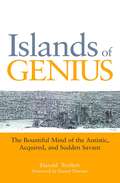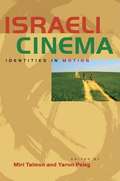- Table View
- List View
Is There No Place on Earth for Me
by Robert Coles Susan SheehanThis renowned journalist's classic Pulitzer Prize winning investigation of schizophrenia--now reissued with a new postscript--follows a flamboyant and fiercely intelligent young woman as she struggles in the throes of mental illness."Sylvia Frumkin" was born in 1948 and began showing signs of schizophrenia in her teens. She spent the next seventeen years in and out of mental institutions. In 1978, reporter Susan Sheehan took an interest in her and, for more than two years, became immersed in her life: talking with her, listening to her monologues, sitting in on consultations with doctors--even, for a period, sleeping in the bed next to her in a psychiatric center. With Sheehan, we become witness to Sylvia's plight: her psychotic episodes, the medical struggle to control her symptoms, and the overburdened hospitals that, more often than not, she was obliged to call home. The resulting book, first published in 1982, was hailed as an extraordinary achievement: harrowing, humanizing, moving, and bitingly funny. Now, some two decades later, Is There No Place on Earth for Me? continues to set the standard for accounts of mental illness.
Is There No Place on Earth for Me?
by Susan SheehanSylvia Frumkin a highly intelligent young girl became a schizophrenic in her late teens and spent most of the next seventeen years in and out of mental institutions. Susan Sheehan followed Sylvia for almost a year, talking with and observing her.
Is There Still Sex in the City?
by Candace BushnellCandace Bushnell gets personal in her new memoir - an investigation into what happens when a woman of a certain age (ok, let's call it 'middle') finds herself not-so-young, free and single in the city.MILFs, cougars, love, sex, divorce - Candace's brilliantly funny and honest first-person account lays bare the truth behind middle-aged romance. Among other revelations we read her Modern Day Cougar Compendium, including guidance on such important matters as the Unexpected Cub Pounce (sometimes the cub does the pouncing); what to do when your age-appropriate date asks you to pay for his kitchen renovation, and the Pluses and Minuses of Being Older and Wiser.
Is There Still Sex in the City?
by Candace BushnellCandace Bushnell gets personal in her new memoir - an investigation into what happens when a woman of a certain age (ok, let's call it 'middle') finds herself not-so-young, free and single in the city.MILFs, cougars, love, sex, divorce - Candace's brilliantly funny and honest first-person account lays bare the truth behind middle-aged romance. Among other revelations we read her Modern Day Cougar Compendium, including guidance on such important matters as the Unexpected Cub Pounce (sometimes the cub does the pouncing); what to do when your age-appropriate date asks you to pay for his kitchen renovation, and the Pluses and Minuses of Being Older and Wiser.
Is This Autism?: A Guide for Clinicians and Everyone Else
by Donna Henderson Sarah Wayland Jamell WhiteThough our understanding of autism has greatly expanded, many autistic individuals are still missed or misdiagnosed. This highly accessible book clarifies many ways that autism can present, particularly in people who camouflage to hide their autistic traits. The authors take the reader step by step through the diagnostic criteria, incorporating the latest research as well as quotes from over 100 autistic contributors that bring that research to life. They also describe many aspects of autism that are not included in the current diagnostic criteria, such as autistic strengths and co-occurring disorders. Readers will learn about highly relevant topics, such as different types of empathy, sensory systems that are not well known, neuro-crash and burn out, and relative versus absolute thinking. This book provides a deep, current, and neurodiversity-affirmative understanding of the less obvious presentations of autism. It is relevant to all healthcare professionals, educators, family members, autistic individuals, and anyone who is curious about autism. A clinical companion guide, Is This Autism? A Companion Guide for Diagnosing, is available for clinicians who make mental health diagnoses.
Is This Autism?: A Companion Guide for Diagnosing
by Donna Henderson Sarah Wayland Jamell WhiteThis companion guide to Is This Autism? A Guide for Clinicians and Everyone Else shows clinicians how to assess for the possibility of autism in clients of all ages. Understanding of autism has greatly expanded in recent years, and many clinicians feel ill-equipped or confused about how to incorporate this knowledge into their diagnostic process. As a result, countless unidentified autistic people do not have reasonable access to proper identification or support. This book describes current assessment methods, including interviewing, rating scales, self-report measures, social cognition tests, and behavioral observations. It also provides guidance regarding cultural considerations, common mistakes, and how to communicate with and support clients through the diagnostic process. This very practical clinical guide provides a clear and neurodiversity-affirmative approach to autism assessment, particularly for autistic individuals who have previously been missed. It is relevant to all healthcare professionals who want to learn how to identify autism in their clients.
Is Your Child Bipolar? The Definitive Resource on How to Identify, Treat, and Thrive with a Bipolar Child
by Mary Ann Mcdonnell Janet Wozniak Judy Fort BrennemanDesigned as a definitive resource on how to identify bipolar disorders in children, this book also focuses of effective treatments and resources available to parents today. McDonnell, who head her own non-profit organization supporting bipolar children, and Wozniak (Harvard Medical School) offer practical information on how to cope with bipolar children and teens and communicate concerns effectively to doctors, teachers and counselors. A section is included on how to properly diagnose a bipolar disorder, and how not to confuse this condition with other types of personality disorders. Annotation ©2008 Book News, Inc. , Portland, OR (booknews. com)
Is Your Job Making You Ill?: How to survive and thrive when it happens to you
by Dr Ellie Cannon'An incredibly helpful guide' Jonny Benjamin MBE'Groundbreaking . . . so relatable given the current way we approach our work' Amy Wall, Woman's WayWhat happens when the effects of work are far more detrimental to your wellbeing than a simple case of Sunday-night blues?Whether you're suffering from work-induced high blood pressure, depression, migraines, or panic attacks, Dr Ellie Cannon has the answer - and it's not quitting your job.We all have a moan about going to work: groaning about getting on the bus in the rush hour, counting down to the weekend. A gripe here and there is understandable and expected, but what happens when your job is making you mentally or physically unwell?When you are in this situation, it can be very difficult to know where to turn, who to speak to or where to find good quality help and advice. In Is Your Job Making You Ill?, Dr Ellie Cannon uses her decade of experience treating patients to create an essential resource for anybody suffering from job-related ill-health.Part one of the book lays out the key causes of job-related illness - from the pressure of an unmanageable workload to the challenges of an emotionally-draining job - and identifies the most common illnesses and symptoms which can occur as a result, including stress, anxiety, insomnia, high blood pressure and IBS.Part two will help you to find a way out. It includes a practical, self-directed programme that can be tailored to your individual circumstances, covering everything from where to find help, when (and if) to seek professional advice or take time off work, to micro-actions like improving your commute and adjusting your diet to support a healthy lifestyle.Work-related ill health can happen to anyone. This book is all about how to survive and thrive when it happens to you. Don't let your job rule your life anymore.
Is Your Job Making You Ill?: How to survive and thrive when it happens to you
by Ellie Cannon'An incredibly helpful guide' Jonny Benjamin MBE'Groundbreaking . . . so relatable given the current way we approach our work' Amy Wall, Woman's WayWhat happens when the effects of work are far more detrimental to your wellbeing than a simple case of Sunday-night blues?Whether you're suffering from work-induced high blood pressure, depression, migraines, or panic attacks, Dr Ellie Cannon has the answer - and it's not quitting your job.We all have a moan about going to work: groaning about getting on the bus in the rush hour, counting down to the weekend. A gripe here and there is understandable and expected, but what happens when your job is making you mentally or physically unwell?When you are in this situation, it can be very difficult to know where to turn, who to speak to or where to find good quality help and advice. In Is Your Job Making You Ill?, Dr Ellie Cannon uses her decade of experience treating patients to create an essential resource for anybody suffering from job-related ill-health.Part one of the book lays out the key causes of job-related illness - from the pressure of an unmanageable workload to the challenges of an emotionally-draining job - and identifies the most common illnesses and symptoms which can occur as a result, including stress, anxiety, insomnia, high blood pressure and IBS.Part two will help you to find a way out. It includes a practical, self-directed programme that can be tailored to your individual circumstances, covering everything from where to find help, when (and if) to seek professional advice or take time off work, to micro-actions like improving your commute and adjusting your diet to support a healthy lifestyle.Work-related ill health can happen to anyone. This book is all about how to survive and thrive when it happens to you. Don't let your job rule your life anymore.
Isaac And Oedipus: A STUDY IN BIBLICAL PSYCHOLOGY OF THE SACRIFICE OF ISAAC (International Library Of Psychology Ser.)
by Wellisch, EFirst Published in 1999. Routledge is an imprint of Taylor & Francis, an informa company.
The Isaiah Effect: Decoding the Lost Science of Prayer and Prophecy
by Gregg BradenSeventeen hundred years ago, key elements of our ancient heritage were lost, relegated to the esoteric traditions of mystery schools and sacred orders. Among the most empowering of the forgotten elements are references to a science with the power to bring everlasting healing to our bodies and initiate an unprecedented era of peace and cooperation between governments and nations.In his groundbreaking new book, The Isaiah Effect, Gregg Braden turns to the Isaiah Scroll, perhaps the most important of the Dead Sea Scrolls discovered in 1946, to offer insight into a powerful form of ancient prayer. In The Isaiah Effect, Braden, author of Awakening to Zero Point and Walking Between the Worlds, combines research in quantum physics with the works of the prophet Isaiah and the ancient Essenes. He demonstrates how prophecies of global catastrophe and suffering may only represent future possibilities, rather than forecast impending doom, and that we have the power to influence those possibilities. In addition to describing multiple futures, the Isaiah texts take us one step further, clearly describing the science of how we choose our futures. Tracing key words of Isaiah's text back to their original language, we discover how he taught a mode of prayer that was lost to the West during Biblical editing in the fourth century. Braden offers detailed accounts of how elements of this mode of prayer have been applied in a variety of situations, ranging from healing life-threatening conditions to entire villages using collective prayer to prevail during the 1998 fires in southern Peru. In each instance, the correlation between the offering of the prayer and a shift of the events in question was beyond coincidence--the prayers had measurable effects! As modern science continues to validate a relationship between our outer and inner worlds, it becomes more likely that a forgotten bridge links the world of our prayers with that of our experience. Each time we engage ourselves, our loved ones, and our communities with Isaiah's life-affirming message of hope, we secure nothing less than our future and the future of the only home we know.From the Hardcover edition.
The Isaiah Effect: Decoding the Lost Science of Prayer and Prophecy
by Gregg BradenSeventeen hundred years ago, key elements of our ancient heritage were lost, relegated to the esoteric traditions of mystery schools and sacred orders. Among the most empowering of the forgotten elements are references to a science with the power to bring everlasting healing to our bodies and initiate an unprecedented era of peace and cooperation between governments and nations.In his groundbreaking new book, The Isaiah Effect, Gregg Braden turns to the Isaiah Scroll, perhaps the most important of the Dead Sea Scrolls discovered in 1946, to offer insight into a powerful form of ancient prayer. In The Isaiah Effect, Braden, author of Awakening to Zero Point and Walking Between the Worlds, combines research in quantum physics with the works of the prophet Isaiah and the ancient Essenes. He demonstrates how prophecies of global catastrophe and suffering may only represent future possibilities, rather than forecast impending doom, and that we have the power to influence those possibilities. In addition to describing multiple futures, the Isaiah texts take us one step further, clearly describing the science of how we choose our futures. Tracing key words of Isaiah's text back to their original language, we discover how he taught a mode of prayer that was lost to the West during Biblical editing in the fourth century. Braden offers detailed accounts of how elements of this mode of prayer have been applied in a variety of situations, ranging from healing life-threatening conditions to entire villages using collective prayer to prevail during the 1998 fires in southern Peru. In each instance, the correlation between the offering of the prayer and a shift of the events in question was beyond coincidence--the prayers had measurable effects! As modern science continues to validate a relationship between our outer and inner worlds, it becomes more likely that a forgotten bridge links the world of our prayers with that of our experience. Each time we engage ourselves, our loved ones, and our communities with Isaiah's life-affirming message of hope, we secure nothing less than our future and the future of the only home we know.From the Hardcover edition.
The Isaiah Effect: Decoding the Lost Science of Prayer and Prophecy
by Gregg BradenSeventeen hundred years ago, key elements of our ancient heritage were lost, relegated to the esoteric traditions of mystery schools and sacred orders. Among the most empowering of the forgotten elements are references to a science with the power to bring everlasting healing to our bodies and initiate an unprecedented era of peace and cooperation between governments and nations. In his groundbreaking new book,The Isaiah Effect, Gregg Braden turns to the Isaiah Scroll, perhaps the most important of the Dead Sea Scrolls discovered in 1946, to offer insight into a powerful form of ancient prayer. InThe Isaiah Effect, Braden, author ofAwakening to Zero Pointand Walking Between the Worlds, combines research in quantum physics with the works of the prophet Isaiah and the ancient Essenes. He demonstrates how prophecies of global catastrophe and suffering may only represent future possibilities, rather than forecast impending doom, and that we have the power to influence those possibilities. In addition to describing multiple futures, the Isaiah texts take us one step further, clearly describing the science of how we choose our futures. Tracing key words of Isaiah's text back to their original language, we discover how he taught a mode of prayer that was lost to the West during Biblical editing in the fourth century. Braden offers detailed accounts of how elements of this mode of prayer have been applied in a variety of situations, ranging from healing life-threatening conditions to entire villages using collective prayer to prevail during the 1998 fires in southern Peru. In each instance, the correlation between the offering of the prayer and a shift of the events in question was beyond coincidence--the prayers had measurable effects! As modern science continues to validate a relationship between our outer and inner worlds, it becomes more likely that a forgotten bridge links the world of our prayers with that of our experience. Each time we engage ourselves, our loved ones, and our communities with Isaiah's life-affirming message of hope, we secure nothing less than our future and the future of the only home we know.
Islam in the Balance: Ideational Threats in Arab Politics
by Lawrence RubinIslam in the Balance: Ideational Threats in Arab Politics is an analysis of how ideas, or political ideology, can threaten states and how states react to ideational threats. It examines the threat perception and policies of two Arab, Muslim majority states, Egypt and Saudi Arabia, in response to the rise and activities of two revolutionary "Islamic states," established in Iran (1979) and Sudan (1989). Using these comparative case studies the book provides important insight about the role of religious ideology for the international and domestic politics of the Middle East and, in doing so, advances our understanding of how, why, and when ideology affects threat perception and state policy. Rubin makes clear that transnational ideologies may present a greater and more immediate national security threat than shifts in the military balance of power: first because ideology, or ideational power, triggers threat perception and affects state policy; second because states engage in ideational balancing in response to an ideological threat. The book has significant implications for international relations theory and engages important debates in comparative politics about authoritarianism and Islamic activism. Its findings about how an Islamist regime or state behaves will provide vital insight for policy creation by the US and its Middle East allies should another such regime or state emerge.
Islamic Counselling: An Introduction to theory and practice
by G. Hussein RassoolIslamic counselling is a form of counselling which incorporates spirituality into the therapeutic process. Until now there has been little material available on the subject with no one agreed definition of Islamic counselling and what it involves. There has also been a rapidly growing population of Muslims in Western societies with a corresponding rise in need of psychological and counselling services. Islamic Counselling: An Introduction to theory and practice presents a basic understanding of Islamic counselling for counsellors and Islamic counsellors, and provides an understanding of counselling approaches congruent with Islamic beliefs and practices from a faith-based perspective. The book is designed as an introduction for counsellors, its goal is to inform the reader about how the diverse roles of the Islamic counsellor fit together in a comprehensive way and to provide the guidelines that can be potentially integrated into a theoretical framework for use. The book is divided into two parts. Section one: Context and Background, and Section two: Assessment, Models and Intervention Strategies. Islamic Counselling encompasses both current theory, research and an awareness of the practice implications in delivering appropriate and effective counselling interventions with Muslim clients. It will be essential reading for both professionals and students alike.
Islamic Psychoanalysis and Psychoanalytic Islam: Cultural and Clinical Dialogues
by Ian Parker Sabah SiddiquiThis pioneering volume brings together scholars and clinicians working at the intersection of Islam and psychoanalysis to explore both the connections that link these two traditions, as well as the tensions that exist between them. Uniting authors from a diverse range of traditions and perspectives, including Freudian, Jungian, Lacanian, Object-Relations, and Group-Analytic, the book creates a dialogue through which several key questions can be addressed. How can Islam be rendered amenable to psychoanalytic interpretation? What might an ‘Islamic psychoanalysis’ look like that accompanies and questions the forms of psychoanalysis that developed in the West? And what might a ‘psychoanalytic Islam’ look like that speaks for, and perhaps even transforms, the forms of truth that Islam produces? In an era of increasing Islamophobia in the West, this important book identifies areas where clinical practice can be informed by a deeper understanding of contemporary Islam, as well as what it means to be a Muslim today. It will appeal to trainees and practitioners of psychoanalysis and psychotherapy, as well as scholars interested in religion and Islamic studies.
Islamic Psychology: Human Behaviour and Experience from an Islamic Perspective
by G. Hussein RassoolIslamic Psychology or ilm an-nafs (science of the soul) is an important introductory textbook drawing on the latest evidence in the sub-disciplines of psychology to provide a balanced and comprehensive view of human nature, behaviour and experience. Its foundation to develop theories about human nature is based upon the writings of the Qur'an, Sunna, Muslim scholars and contemporary research findings. Synthesising contemporary empirical psychology and Islamic psychology, this book is holistic in both nature and process and includes the physical, psychological, social and spiritual dimensions of human behaviour and experience. Through a broad and comprehensive scope, the book addresses three main areas: Context, perspectives and the clinical applications of applied psychology from an Islamic approach. This book is a core text on Islamic psychology for undergraduate and postgraduate students and those undertaking continuing professional development in Islamic psychology, psychotherapy and counselling. Beyond this, it is also a good supporting resource for teachers and lecturers in this field.
Islamic Psychology: The Basics (The Basics)
by G. Hussein RassoolIslamic Psychology: The Basics is a jargon-free and accessible introduction that explores psychology from an Islāmic perspective, and provides a foundation level overview of the fundamental principles and practices of Islāmic psychology. The book introduces concepts, models, approaches, themes, and theories you need to know to study the mind, soul, and behaviour based on Islāmic scripture. Offering an overview of Islāmic psychology and what Islāmic psychologists do, chapters address key topics including the history of the evolution of the science of the soul, and the psychology of human behaviour and experiences. Rassool examines the concepts of the Fitrah, the Nafs (Self), the Aql (Intellect), the Rūḥ (Soul) the Qalb (Heart), and the concept of Islāmic healing and spiritual interventions. Other themes include the Qur’an and psychology, models and approaches in Islāmic psychology, interpreting Islāmic psychology for modern times, and the contemporary scope of the practice of Islāmic psychology. Outlining the challenges and solutions of the development of Islāmic psychology and potential future trends, and including features to aid learning, this is the ideal introductory book for students in Psychology, Islāmic Psychology, and Islāmic Studies, as well as professionals including counsellors and therapists, and anyone interested in psychology from an Islāmic perspective.
Islamische Bildungsarbeit in der Schule: Theologische und didaktische Überlegungen zum Umgang mit ausgewählten Themen im Islamischen Religionsunterricht (Edition Fachdidaktiken)
by Fahimah Ulfat Ali GhandourDer Band ermöglicht unterschiedliche Zugänge und Denkkulturen zu verschiedenen theologischen Thematiken, die vordergründig aus einer Bildungsperspektive gedacht werden. Dabei wird die Breite der muslimischen Konzepte in ihrer Pluralität abgedeckt, mit je nach Autorin oder Autor systematischen, philologischen, philosophischen oder historischen Schwerpunktsetzungen, sowie einer pädagogischen Schwerpunktsetzung.
Islamophobia and Psychiatry: Recognition, Prevention, And Treatment
by H. Steven Moffic John Peteet Ahmed Zakaria Hankir Rania AwaadThe book begins by covering the general and clinical challenges that are unique to Muslims, drawing from an internationally, ethnically, and intergenerationally diverse pool of experts. The text covers not only how psychiatrists and other clinicians can intervene successfully with patients, but how we as clinicians can have a role in addressing other societally connected mental health challenges arising from Islamophobia. The text addresses three related but distinct areas of interest: Islamophobia as a destructive force, Islam as a religion that is threatened by stigma and misinformation, and the novel intersection of these forces with the field of psychiatry. Islamophobia and Psychiatry is a vital resource for all clinicians and clinicians in training who may encounter patients struggling with these issues, including adult and child psychiatrists, psychologists, primary care physicians, counselors, social workers, and others.
Island
by Patrick DownesA teenaged boy struggles as he watches his family and relationships fracture after the death of his mother, and is now faced with the terrible possibility that his twin brother may have just killed their father.Seventeen-year-old Rad comes home to find his father lying broken and dead at the bottom of the ravine behind their house. Rad’s twin brother, shaken but very much alive, had watched their father fall.Desperate to understand what has happened before calling the police, Rad confronts his brother and the complicated landscape of their past. He reconstructs not just the circumstances leading to his father’s death, but the history of his family.How can a family simply disintegrate? Were they ever happy, or were the roots of unhappiness always there? What plagued his father? What plagues Rad?As the time comes to do the right thing, the question remains. Did his brother kill their father? And what will happen to the boys now?
The Island of the Colorblind
by Oliver SacksOliver Sacks has always been fascinated by islands--their remoteness, their mystery, above all the unique forms of life they harbor. For him, islands conjure up equally the romance of Melville and Stevenson, the adventure of Magellan and Cook, and the scientific wonder of Darwin and Wallace. Drawn to the tiny Pacific atoll of Pingelap by intriguing reports of an isolated community of islanders born totally color-blind, Sacks finds himself setting up a clinic in a one-room island dispensary, where he listens to these achromatopic islanders describe their colorless world in rich terms of pattern and tone, luminance and shadow. And on Guam, where he goes to investigate the puzzling neurodegenerative paralysis endemic there for a century, he becomes, for a brief time, an island neurologist, making house calls with his colleague John Steele, amid crowing cockerels, cycad jungles, and the remains of a colonial culture. The islands reawaken Sacks' lifelong passion for botany--in particular, for the primitive cycad trees, whose existence dates back to the Paleozoic--and the cycads are the starting point for an intensely personal reflection on the meaning of islands, the dissemination of species, the genesis of disease, and the nature of deep geologic time. Out of an unexpected journey, Sacks has woven an unforgettable narrative which immerses us in the romance of island life, and shares his own compelling vision of the complexities of being human.
The Island of the Colorblind
by Oliver SacksOliver Sacks has always been fascinated by islands--their remoteness, their mystery, above all the unique forms of life they harbor. For him, islands conjure up equally the romance of Melville and Stevenson, the adventure of Magellan and Cook, and the scientific wonder of Darwin and Wallace.Drawn to the tiny Pacific atoll of Pingelap by intriguing reports of an isolated community of islanders born totally color-blind, Sacks finds himself setting up a clinic in a one-room island dispensary, where he listens to these achromatopic islanders describe their colorless world in rich terms of pattern and tone, luminance and shadow. And on Guam, where he goes to investigate the puzzling neurodegenerative paralysis endemic there for a century, he becomes, for a brief time, an island neurologist, making house calls with his colleague John Steele, amid crowing cockerels, cycad jungles, and the remains of a colonial culture.The islands reawaken Sacks's lifelong passion for botany--in particular, for the primitive cycad trees, whose existence dates back to the Paleozoic--and the cycads are the starting point for an intensely personal reflection on the meaning of islands, the dissemination of species, the genesis of disease, and the nature of deep geologic time. Out of an unexpected journey, Sacks has woven an unforgettable narrative which immerses us in the romance of island life, and shares his own compelling vision of the complexities of being human.From the Hardcover edition.
Islands of Genius
by Darold A. Treffert* Gold Medal Winner in the Psychology / Mental Health Category of the 2011 IPPY Awards ** Silver Medal Winner in the 2010 BOTYA Awards Psychology Category *Savant syndrome is a rare condition in which individuals with developmental disorders, including autism spectrum disorders, have one or more areas of expertise, ability, or brilliance - "islands of genius" - that exist in contrast with their overall limitations. In this fascinating book, Dr. Darold Treffert looks at what we know about this remarkable condition, and at new discoveries that raise interesting questions about the hidden brain potential within us all. Dr. Treffert explores the phenomena of genetic memory - instances in which individuals somehow "know" things they never learned - and sudden genius or "acquired savantism" - where a neuro-typical person unexpectedly and spectacularly develops savant-like abilities following a head injury or stroke. Showing that these phenomena point convincingly towards a reservoir of untapped potential - an inner savant capacity - within us all, he looks both at how savant skills can be nurtured, and how they can help the person who has them, particularly if that person is on the autism spectrum. A central colour section contains the extraordinary artwork of some of the savants who are mentioned in the book. Islands of Genius will intrigue anyone who has ever wondered what makes the mind of a savant tick, as well as clinicians, parents, teachers, therapists, and others who care for, and about, individuals with savant syndrome.
Israeli Cinema
by Miri Talmon Yaron PelegWith top billing at many film forums around the world, as well as a string of prestigious prizes, including consecutive nominations for the Best Foreign Film Oscar, Israeli films have become one of the most visible and promising cinemas in the first decade of the twenty-first century, an intriguing and vibrant site for the representation of Israeli realities. Yet two decades have passed since the last wide-ranging scholarly overview of Israeli cinema, creating a need for a new, state-of-the-art analysis of this exciting cinematic oeuvre. The first anthology of its kind in English, Israeli Cinema: Identities in Motion presents a collection of specially commissioned articles in which leading Israeli film scholars examine Israeli cinema as a prism that refracts collective Israeli identities through the medium and art of motion pictures. The contributors address several broad themes: the nation imagined on film; war, conflict, and trauma; gender, sexuality, and ethnicity; religion and Judaism; discourses of place in the age of globalism; filming the Palestinian Other; and new cinematic discourses. The authors’ illuminating readings of Israeli films reveal that Israeli cinema offers rare visual and narrative insights into the complex national, social, and multicultural Israeli universe, transcending the partial and superficial images of this culture in world media.
